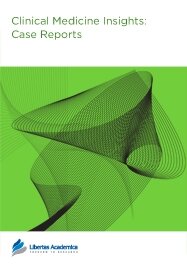

Publication Date: 03 Jul 2011
Type: Case report
Journal: Clinical Medicine Insights: Case Reports
Citation: Clinical Medicine Insights: Case Reports 2011:4 39-42
doi: 10.4137/CCRep.S7002

Lung herniation is a relatively rare clinical entity that is most commonly either congenital or acquired traumatically. We describe a case of spontaneous lung herniation secondary to acute cough in an obese male smoker complicated by contralateral acute lung injury and systemic inflammatory response syndrome (SIRS). Mechanisms of lung herniation, classification, diagnosis, and management will be discussed.
PDF (1.14 MB PDF FORMAT)
RIS citation (ENDNOTE, REFERENCE MANAGER, PROCITE, REFWORKS)
BibTex citation (BIBDESK, LATEX)
XML
PMC HTML

The process of submission and publishing was a great experience. During the few weeks from the submission to publication I have worked with high quality staff. In my opinion, the easy communication was the most important characteristic of Libertas and an important influence on the final quality of the article. I definitely recommend the publisher to my colleagues.

All authors are surveyed after their articles are published. Authors are asked to rate their experience in a variety of areas, and their responses help us to monitor our performance. Presented here are their responses in some key areas. No 'poor' or 'very poor' responses were received; these are represented in the 'other' category.See Our Results
Copyright © 2013 Libertas Academica Ltd (except open access articles and accompanying metadata and supplementary files.)
Facebook Google+ Twitter
Pinterest Tumblr YouTube